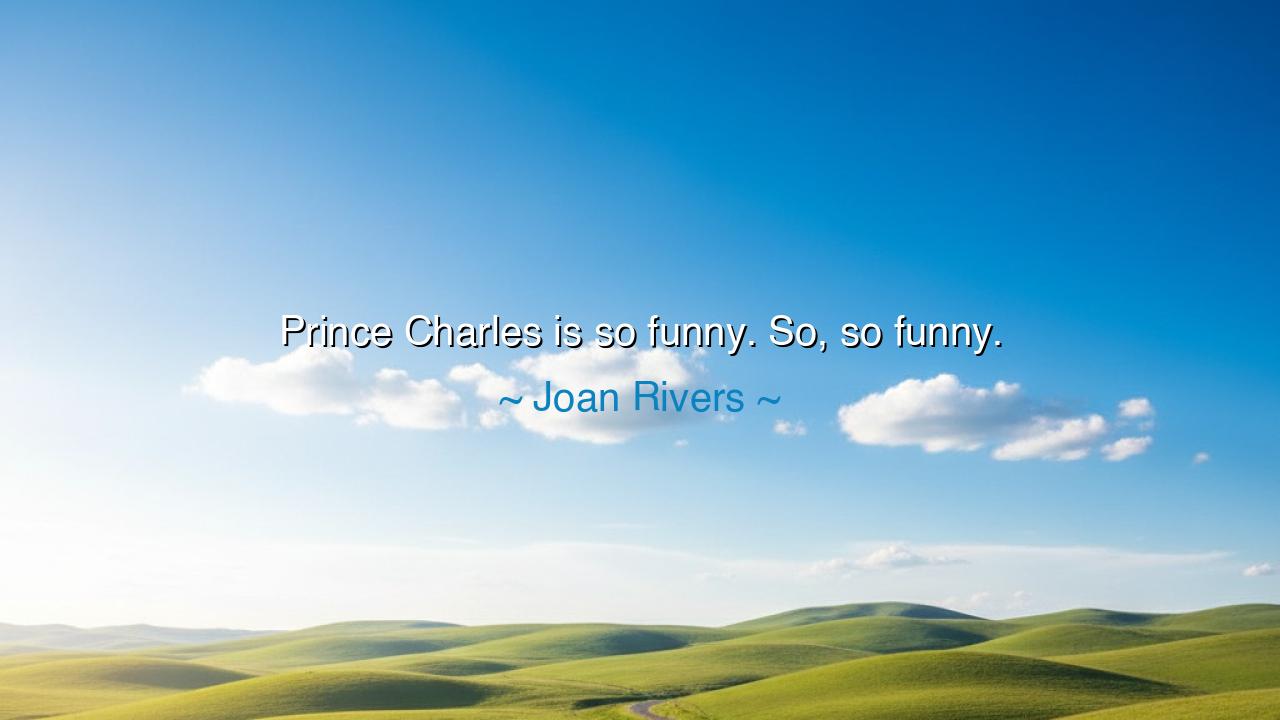
Prince Charles is so funny. So, so funny.






In the words of Joan Rivers, “Prince Charles is so funny. So, so funny.” — there lies more than mere laughter. On the surface, it is a simple expression of amusement, a comedian’s praise for a royal’s wit. But beneath its sparkle lies an ancient truth about humor, humanity, and the mysterious bridge that laughter builds between those who rule and those who live under rule. Rivers, a woman of fierce intellect and sharp tongue, recognized something rare in the heir to the British throne — a warmth, a self-awareness, a lightness of being that could pierce even the gilded armor of monarchy. Her words, though brief, whisper a profound lesson: that humor unites what hierarchy divides.
The meaning of this quote extends far beyond the laughter it describes. To call a prince “funny” is to acknowledge his humanity. For humor, more than any royal decree or symbol of power, reveals the truth of the soul. A person who can laugh — especially one burdened by duty — shows a spirit that has not been crushed by expectation. Rivers, a lifelong observer of power and pride, saw in Prince Charles not the pomp of kingship, but the twinkle of a man who still understood joy. Her admiration was not for his crown, but for his humility, for his ability to laugh — at the world, and perhaps, at himself.
The ancients knew that the ability to laugh was the mark of wisdom, not folly. Socrates once said that humor is born of recognition — that the wise man laughs because he sees both the greatness and the absurdity of human life. A ruler who can laugh, then, is a ruler who understands the balance of power and frailty. The great Emperor Marcus Aurelius, though known for his Stoic discipline, was said to have a gentle smile for the foolishness of men, even his own. He wrote in his meditations that “it is better to meet misfortune with a smile than to curse it,” for laughter disarms fate. Thus, when Rivers praised Charles’ humor, she was in truth praising his philosophy of being — the rare art of seeing the world with eyes both wise and kind.
It is also a reflection of Joan Rivers’ own journey as a woman of wit. She wielded laughter as both sword and shield — cutting through pretense, yet protecting herself from the pain of life. When she recognized humor in a man of royal standing, she was recognizing a kindred soul — another who understood that laughter is not frivolity but survival. She, who had faced rejection, loss, and rebirth, knew that only those who have lived deeply can truly be funny. In Charles, she saw not just a monarch-to-be, but a man who carried the burden of expectation with grace and lightness. To her, that was divine humor — the kind that redeems rather than mocks.
The origin of this praise lies in the meetings between two very different worlds: comedy and royalty, irreverence and decorum. Rivers, the queen of satire, who dared to speak the unspeakable, found in the Prince — known for his gardens, his careful speech, his quiet rebellion against modernity — a surprising equal in wit. It is said that they shared moments of laughter that transcended station and status. For in laughter, there is no crown, no stage, no barrier — only the shared truth of being human. It is in this shared laughter that the comedian and the prince, the rebel and the ruler, become the same.
The lesson we draw from this is eternal: that laughter is the great leveler, the bridge between souls. No matter one’s station in life — peasant or prince, artist or king — humor reminds us that all are bound by the same fragility, the same folly, the same fleetingness of being. To laugh together is to acknowledge that the things we hold too tightly — pride, status, sorrow — can be released, if only for a moment. Rivers teaches us through her praise that true greatness is not found in solemnity, but in self-awareness. A person who can laugh, and make others laugh, walks in wisdom’s light.
Therefore, my friends, let us follow the spirit of Joan Rivers and Prince Charles alike: let us cultivate laughter not as escape, but as understanding. Seek humor not in mockery, but in the honest recognition of life’s contradictions. Laugh at yourself, for it frees the soul; laugh with others, for it unites hearts. When the weight of the world grows heavy — when duty, fear, or sorrow press upon you — remember that laughter is not weakness, but resilience in motion.
For in the end, as Rivers’ simple words remind us, to be “so, so funny” is not to be light-minded — it is to be light-bearing. It is to lift others through joy, to carry one’s burdens with grace, and to reveal through laughter what words alone cannot: that the divine spark within us all shines brightest when we dare to smile.






AAdministratorAdministrator
Welcome, honored guests. Please leave a comment, we will respond soon